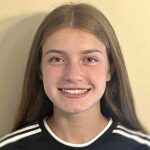Yael Averbuch’s inspiring keynote speech from 2010 NSCAA Women’s Soccer Breakfast
“Ever since I was a nine-year-old, attempting to get 10 thigh juggles on my front lawn, it has been my dream to be a professional soccer player. As a little girl, in my Mia Hamm jersey, I had no concept of exactly what that meant.”
– Yael Averbuch
If you or someone you know is a young soccer player looking for some guidance on how to achieve their dreams, this speech absolutely must be read! It is the keynote speech given by New Jersey Sky Blue and US National team player Yael Averbuch during the recent National Soccer Coaches Association of American conference held in Philadelphia, PA.
The keynote was part of the 500+ attendee breakfast banquet for Women’s Soccer, where Baltimore’s Louise Waxler was honored with the annual “NSCAA Women’s Committee Award of Excellence”. In the speech, Miss Averbuch walked the attendees through everything that happened from that day in her front yard to today, and it is a wonderful story, full of advice for every aspiring young soccer player.
I witnessed the speech live this past Saturday, and knew it had to be printed in public. Hopefully it will provide you and/or the young players you know with a bit of a road map not only for how to reach goals, but also for how to cherish the process of getting there. Many thanks to Miss Averbuch for allowing us to reprint this here. I know I will certainly focus more on enjoying the process, and hope it helps you too!
—
Good morning everyone. I’d like to start by thanking the women’s committee for inviting me here today, and to congratulate Louise Waxler on the Award of Excellence. I’d also like to acknowledge someone who unfortunately is not here today…Charlotte Moran. Charlotte was my mom away from home at countless Regional events, and never ceased to make me laugh, even during the most stressful moments of the ODP process.
When I was first asked to speak in front of this group, I have to be honest, I was slightly overwhelmed. Many of you in this room are the ones to whom I look for wisdom, and who have provided life-changing guidance to me over the years. As I started to jot down some ideas, I realized that the person I am today is the result of so many different elements—elements I’ve picked up from some of the very people who I am standing in front of right now. These elements form the essence of what has become my passion.
Ever since I was a nine-year-old, attempting to get 10 thigh juggles on my front lawn, it has been my dream to be a professional soccer player. As a little girl, in my Mia Hamm jersey, I had no concept of exactly what that meant. There was no way I could have imagined what lay ahead, what it would take, or how I would get there. But I knew what I wanted, and my goals have never wavered. Roughly a year ago, my childhood dream became reality when I signed my first professional contract with Sky Blue FC.
As a 23-year-old professional player, and current member of the Women’s National Team, I still see my journey as far from complete. Some people may look at my resume and think I’ve “arrived,” but I see my career as just beginning. It’s a strange feeling to finally accomplish a goal for which you have sweat, bled, and cried for nearly 15 years to achieve. I would have expected to feel overjoyed—even just simply content. But while I am very proud of what I have achieved to this point, none of those emotions are fitting. As I embarked on my first professional season, at times I almost felt a sense of disappointment. I found myself thinking, “Is this really IT?” It was in uncovering the answer to this question that I came to truly realize why I do what I do.
Since the summer of 2000, when I was 12 years old and away from home at the UNC summer camp, I’ve kept a journal. I wrote down every single thing we did at camp, so that I could go home and perfect it—all for the day that I would play for UNC.
My journal, which has since then expanded into 5 written books, as well as a computer document, is filled with my thoughts, worries, goals, disappointments, and successes. There are quotes from books, movies, coaches I’ve had…there are song lyrics…even a couple of pages where I practiced my autograph (those are in the earlier journals, of course!).
It’s really enlightening to look back through my journal, because it’s an account of my journey, step by step, stripped of any of the perspective I have gained more recently. There is profanity, important things written in capital letters—even a list of players who I planned to overtake, and have crossed off as I felt that I had surpassed them.
There is an entry from December of 1999 in which I recorded parts of a conversation I had with my first real mentor, and coach at the time, Ashley Hammond. Under his name, I have the following quote: “People in the world need and love experts. In soccer, you must be an expert in many skills.” I was 13 when I wrote that down.
May 5th, 2003 (when I was 16): “Daddy gave me this article on being a master, and I’m gunna (spelled G-U-N-N-A) read it and become a soccer master!”
My journal is sometimes comprised of longer written segments, sometimes just tidbits or bullet points, but the combination has helped me to piece together why I do what I do.
Every month, I like to set myself 4 or 5 personal goals or ideas to keep in mind. I start off by choosing a quote or motto as a theme for the month, and then I pick a few simple goals to aim for. For example, in April, as we started the first WPS season, my monthly phrase was, “go with the flow.” May’s was, “play without a conscience.” The reason I’m sharing this with you is because I think that my December 2009 phrase captures what I have finally come to realize is most important in my quest for greatness in soccer. December’s motto was: “love the process.”
This concept has come to mean something very important to me. I am an extremely driven person—some might say I am focused to the point of obsession. But now that soccer is my profession, I have found that I need to put it in greater perspective within my life. The best way I have come to define my drive is this: I work TOWARDS a goal, but I do not work FOR it.
Let me distinguish. Anyone who looks at my training schedule would either A. consider me an extremely hard worker, or B. think I’m crazy. I don’t define myself as the latter (although my family might argue that in many ways I’m not sane). I truly and whole-heartedly love what I do. And I would love what I do even if I never got the opportunity to play for a professional team, win a national championship, or represent my country. A friend of mine recently said to me: “You’re the luckiest person in the world. Your hobby is your job.” And he couldn’t have been more right. One of my goals has always been never to “work” a day in my life. I don’t consider what I do as work, because every day that I train and compete, I find even greater joy in the process.
I believe that finding this joy, and loving the process itself, is essential. To truly be the best at what you do, the path will never be easy. The love of what we do is what provides the inspiration to see us through. My path to where I am today hasn’t always been smooth. I’ve spent so many evenings slamming a ball angrily against the kickback in my backyard or the schoolyard wall up the block from my house—tears streaming down my face, wondering why so-and-so was invited to whatever event, or is starting instead of me.
And every time that I think I’ve reached smooth sailing, I am soon humbled. I was very confident going into this past WPS season. I was a first-round draft pick, felt well-prepared after my college career at UNC, and had done everything that I could to be ready for pre-season. I was sure that I could play at the next level and be successful. Before our home opener against the LA Sol, I was shocked when we got the starting line-up and I wasn’t in it. My relatives had flown in from California and Arizona to see my first pro game, and all of my former coaches from New Jersey were there. Basically, everyone I know was at the game to see me play. I assumed I’d play the second half, considering that I thought I was going to start, but wasn’t in the lineup. However, as the clock ticked away in the second half, and then as the final whistle blew, I was still sitting on the bench—not even asked to warm up. I was honestly shocked, and devastated. There will never be another inaugural season Sky Blue FC home opener, and I hadn’t even gotten the opportunity to step onto the field in front of my home crowd.
It’s interesting to contemplate how our lives build to these special, pivotal moments—the moments we dream of, work towards, and emphasize so heavily. But, in truth, the bulk of our life is in the in-between time, the waiting. The “off moments,” so to speak. The special moments are only minor reference points along the way. After an extremely angry and disappointed drive home from that Sky Blue FC opener, that is what I came to realize. I don’t play this sport for the moment of glory. And I think the people who DO are missing out. Yes, I love roar of the crowd, the championship game, and the thrill of performing when it really matters—but I love the preparation—the process—equally as much.
I didn’t always love the game the way I do now. I learned that love, just as I’ve learned numerous other skills. I feel very fortunate to have had great coaches and mentors along the way. As I mentioned earlier, I’m a big quote person. When I read or hear something that feels true to me, I’m always sure to write it down. In the book Blue Like Jazz by Donald Miller, it says, “Sometimes you have to watch somebody love something before you can love it yourself. It is as if they are showing you the way.”
I believe that my club coach of many years, Kazbek Tambi, showed me how to love the game. Recently, I got a call from Kaz (as we call him) to come play on New Year’s day. Here’s a guy who is long past his prime, but opens up his indoor facility on every holiday just to hang out and watch (and occasionally jump in with) any players who he can get to show up. There’s always techno music playing over the loud speakers, and the guys get together and just play small-sided. On New Year’s, it was a group of about 40 guys, most of whom work for Kaz, or are current or former college players and pros. The majority of them aren’t training for anything in particular, though. (And I should probably add that most of them don’t speak English as their first language.) They certainly don’t have to wake up early on New Year’s day and trek out in the cold and snow to show up. But they love to play, watch, and be around the game. And this is the environment that Kaz creates. Through watching Kaz’s love for soccer, and being thrown into this atmosphere, I came to understand firsthand why soccer is referred to as “the beautiful game.” And I came to love it as something beyond my goals and aspirations.
I remember once, a lot of the girls on my U-18 club team were burned out and wanted a break. When they expressed this to Kaz, he was incredibly confused. He sat the group down and in all seriousness, gave us a talk that went something like this: “If you love something, why would you ever want to take a break from it? It’s like, if you love ice cream and you eat it every day, you would never one day suddenly want to take a break from eating ice cream. Why isn’t soccer the same way?” It may seem silly, but it made perfect sense to me.
I’m not trying to claim that I am always happy, smiling, and joyous when it comes to soccer. I take my goals and my career extremely seriously, and at times, it is very stressful, because I care SO much. I’m sure it’s the same for most of you in this room. Sometimes, my entire life seems to revolve around soccer and my training. And if you think I’m exaggerating, my pin number for my debit card is my juggling record (Hopefully none of you know my record!) So, in the tough times, when I don’t feel like I’m finding success, it’s easy to question why I put so much time and effort (both mental and physical) into something that seems not to be paying off.
During the past WPS season, I read the book, Way of the Peaceful Warrior, by Dan Millman. A major premise of the book is this line: “It’s not about dedicating your life to training, but about dedicating your training to your life.”
This was an interesting new perspective for me. Yes, I dedicate an astounding number of my waking hours to soccer. Whether I’m training, watching soccer, or even just thinking about it, my life is consumed by the game. But what does this all mean in the bigger picture? I find that for what I put INTO the game (which is obviously a great deal of myself), I get back tenfold. In addition to the personal relationships I’ve created, the discipline I’ve learned, the places I’ve traveled—I realize now that soccer is about something far more for me.
My training gives back to me in ways deeper than just success on the field. There is a sense of freedom, of peace, that I feel when I have a soccer ball at my feet. I believe that some people play, some teach, some write, some dance—all simply to attain those few moments of personal freedom. We’ve all experienced it—the perfectly pure, uncompromised joy of being here, now. It is the moment of peace when all else fades away, and you are left fearless and energized. Fully present in the process of your activity, performance is effortless and results are insignificant. It’s often described as “flow” or being “in the zone,” but whatever you call it, we are all familiar with that sensation–when you’re doing something enjoyable, and it just comes so easily. This feeling for me doesn’t necessarily come in a moment of glory, in the last five minutes of a game, or in a winning play. It’s born from the passion of what I do when it “doesn’t matter,” when no one is watching, when nothing is at stake.
I find this feeling in the process, more often than I do in the result. I was reminded of this the night my college soccer career ended. We had just won the 2008 National Championship, and I sat in my room in Chapel Hill, actually feeling depressed, rather than satisfied. The team was out celebrating, and all I could seem to think about was the fact that it was finished. That was it. All those Tuesdays of doing fitness, all the excruciating pre-game meetings, the effort, nerves, preparation to win a national championship, and it was over. Just like that. I felt like I would have given back my national championship to spend just one more week with the team. The more I thought about it, the more it dawned on me. It was the PROCESS of winning that I loved, not so much the actual win.
Editor’s Note: After the line above, “…excruciating pre-game meetings”, Averbuch acknowledged that Anson Dorrance was in the room, saying to him with a huge smile “Sorry Anson, but you always say the same thing.”
And when I think back on my life since I began playing soccer, the seemingly unimportant moments are the ones that come to mind first. It’s the videos I watched with my dad to learn about the game, and all our ridiculously naïve ideas on how things should be done. I remember trying to dribble in circles around a tree stump near my house to practice using the outside of my feet.
It’s the times playing on my own in the racquetball court, lost in the music of my ipod, when management would actually turn out the lights on me when my time was up. I would have to search for my phone and car keys in the dark.
It’s the time spent in parking garages, and basements of hotels, practicing tricks I had seen…or making up silly ways of training in the house when it was snowing outside.
It’s the time in elementary school when I was juggling at the bus stop and our Southern neighbor drove by and yelled, “Y’all can’t be playing soccer every dayyyy.” I knew I could prove him wrong!
It’s the time I was in Florida to watch my sister play a tournament, and I went to kick the ball around at some field that was more dirt than grass. I was struggling to curl the ball into the goal from behind the goal line, so actually from behind the goal. It was taking a lot of tries, and I was getting frustrated, until I looked up and saw a group of guys who had been playing on the other half of the field. They had stopped, and were watching my efforts. They had clearly come straight from work to play…I’m pretty sure one or two of them were actually wearing cargo pants, and there were a variety of languages floating across the field. I still remember their cheers and celebration when I finally bent the ball in. It honestly felt just as good as any goal I’ve ever scored.
It’s these moments that comprise the process, and that are most special to me.
As I learned the night of the 2008 national championship, if everything that you do, day in and day out, is solely building for a single moment—what becomes of it all when that moment has passed? It is this perspective that I have gained during the past year, and which I hope to carry with me throughout my life: Ideally, what we do in each moment should have value in and of itself. We should train just for the sake of training, play just for the sake of playing, and live just for the sake of living.
Winning is a process. Success is a process. Happiness is a process. And this point in my career is only one sliver of time within my process.
I have always believed that there is no limit to the rate of my improvement as an athlete, soccer player, and person. I pride myself on the fact that I seek to improve every day, every month, and every year. As Anson put it, “We should all strive to live on a never-ending path of ascension.” It is the PATH that Anson talks about and emphasizes, not the destination.
I used to look around and see players who were ahead of me, and envy what they had or where they were. I think we all do that. We see the success of others, and we are jealous of them, or focus on our own shortcomings in comparison. However, today I can honestly say that I wouldn’t trade places with any one of those players—not for a second. To me, professionalism is about realizing my own personal worth, and bringing that to the table—or the field—every day.
I got to put this into practice often this past fall, when I trained a lot with Heather O’Reilly. Heather and I probably couldn’t be more opposite types of players. Her strengths are areas in which I could most improve, and vice versa. But this fall, we both embraced this fact, and it was some of the most fun I’ve ever had training. Heather pushed me to be quicker, more athletic, and more intense. Yet, I distinctly recall one day when we had done a series of sprints, and she was visibly feeling very confident and good about herself. So, of course I knew I had to quickly put an end to that! “Hey Heath,” I shouted over to her, still out of breath from the fitness. “Wanna have a juggling competition?” I had to bring her back down to earth! That’s one reason soccer is so special, and training with Heather has helped me to believe in myself, and never to take my strengths and unique qualities for granted.
Yes, I’m still extremely competitive with my teammates. Yes, I still strive to improve my weaknesses, and constantly analyze every aspect of my game. But I don’t let that take away from the core of who I am as a player and a person, which is something that I have crafted over time, and I am very proud of.
I’ve learned that we all have something to share. It’s often the little things that make me aware of this. It’s the impact I can have on younger players, those little girls who are where I once was. A couple of weeks ago, I was making an appearance for Sky Blue FC, and I was asked to take a picture with a young girl. This kind of thing has become routine for WPS players, but as I put my arm around her, I realized that she was trembling. I was really moved to know that I could have this kind of effect on someone—that I could perhaps be an important part of her journey, someone she might remember for something I said or did.
I have a tremendous amount of respect for everyone in this room, because you have the platform to shape players’ journeys. You might never know the little things you do that will change a person’s life. Maybe it’s as simple as a smile at the right time, or a silly speech about ice cream. Even on the days when you feel like your athletes or co-workers couldn’t care less, and that no one is listening, there’s that one player in the group whose eyes light up when you speak, who is hanging on your every word, who will quote you in her journal. Coach for that player.
Anson writes each senior a personal note before they’re finished playing for him. I know my letter talks about soccer, national championships, and player of the year awards, but the following passage from the letter is what I have recorded in my journal, and what means more to me than anything else he could have said. Anson wrote:
“But of all your wonderful achievements, what I cherish most is the lasting effect you have had on our culture here. You made sure everything was fun. Sometimes, in the fight for athletic success, many of us lose sight of what this is all about, and you never let us.”
So, when I reflect back on the 15 years I’ve spent so far involved in this game, and the lifetime ahead I plan to, I hope to have an impressive list of accomplishments. I want to defend the WPS Championship, win a World Cup, and an Olympic gold medal. But when all is said and done, it is not only those accolades that I will cherish.
I will always smile when I think about the time at UNC when we were about to start our first of 10 cones (a dreaded fitness drill) and, as Anson yelled “GO!” we all fell to the ground as a joke.
I will always look forward to being home in New Jersey, where I can go kick the ball around at the local schoolyard with my sister.
I will always feel sentimental when I think about playing pickup on Fetzer Field (our UNC game field) in Chapel Hill at midnight, under the single light that’s left on.
I will always laugh when I reminisce on the absurdity and turbulence of Sky Blue FC’s first season, when, it seems, we had more coaches than are currently sitting in this room.
And my eyes will always light up when I see a ragtag group of guys playing soccer in some random park on the side of the road.
These are the things that I love most about this game, because for me it’s about the journey, not the destination.
Copyright © 2010 by Yael Averbuch/Sky Blue FC. Inquiries or permission to reprint, contact John Archibald at [email protected]
About the Author
Originally from Upper Montclair, New Jersey, Yael Averbuch was drafted by WPS champions New Jersey Sky Blue FC as the 4th overall pick in last year’s inaugural Women’s Professional Soccer draft. This after starring four years for the University of North Carolina, where she helped the Tar Heels to two national titles in 2006 and 2008. She set a UNC school record for most consecutive starts (105), and was named to the NSCAA All-America second team and earned NSCAA Scholar-Athlete of the Year and NCAA VIII Award honors in 2008. She also earned NSCAA All-America first team status in 2006 and 2007. Her US national team experience includes the 2007 Four Nations Tournament in China with the full women’s team and MVP honors as the US U-23 National Team captured the 2008 Nordic Cup. She also competed for the US at the 2004 FIFA U-19 Women’s World Championship, and played on the U-17s in 2003 and the U-16s in 2002. To forward your comments or questions to Yael, send an email to [email protected], or find her on Facebook.











